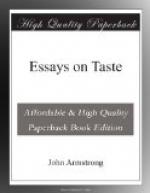But if you find it necessary to comply with the humour of your age; the writing best calculated to please a false taste is what has something of the air of good writing, without being really so. For to the vulgar eye the specious is more striking than the genuine. The best writing is apt to be too plain, too simple, too unaffected, and too delicate to stir the callous organs of the generality of critics, who see nothing but the tawdry glare of tinsel; and are deaf to every thing but what is shockingly noisy to a true ear. They are struck with the fierce glaring colours of old Frank; with attitudes and expressions violent, distorted, and unnatural: while the true, just and easy, the graceful, the moving, the sublime representations of Raphael have not the least power to attract them. The bullying, noisy march in Judas Macchabeus has perhaps more sincere admirers than that most pathetic one in Saul: and in conversation pertness and mere vivacity is more felt by the general run of company than easy unaffected wit; as flashy, bouncing, flatulent cyder boasts of more spirit than the still vigour of reserved Madeira.
But the easiest, as well as the most effectual way of writing to the bad taste of your age, is to set out while your genius is yet upon a level with it. Accordingly, if you have a son who begins to display a hopeful bloom of imagination, be sure to publish, with all the advantages that can be procured, the very first essays of his genius. They will hardly be too good to please; and besides, they have a chance to be received with particular favour and admiration as the productions of a young muse. When he has thus taken possession of the public ear, he may venture, as his genius ripens, to do his best; he may write as well as he can, perhaps without much danger of sinking in reputation. The renown of his first crude essays will be sufficient to prejudice the mobility, great and small, in favour of the most exquisite pieces he can produce afterwards. But if he must live by his wit, the best thing you can do for him is to transplant him, as early as possible, to PARIS; where in the worst of days, in the most Gothic muse-detesting age, there is still some shelter afforded to the most delicate as well as the most uncommon flower that blossoms in the human mind. In that gay serene and genial climate the muses are still more or less cultivated, though not with the same ardour and passion in every age; as appears from the following passage translated from a[A] French author, who wrote about the beginning of the present century. “Almost all the arts have in their turns experienced that disgust and love of change which is natural to mankind. But I don’t know that any one of them has felt it more than Poetry; which in some ages has been exalted to a triumphal heighth, in others neglected, discouraged and despised. About sixty years ago, under the administration of one of the greatest geniuses that ever France produced, poetry found itself amongst us at its highest pitch of glory. Those who cultivated the muses were regarded with particular favour: this art was the road to fortune and dignified stations. But in these days this ardour seems to be considerably abated. We do not appear to be extremely sensible to poetical merit, &c.”




